Sorkin’s Masterclass – An Editor’s Review
- Learn screenwriting from the writer of West Wing and The Social Network
- Deepen your understanding of the craft of cinematic storytelling
- Masterclass is great value and incredibly well executed
It’s a very rare thing to be able to describe something as a masterclass without any hint of hyperbole. But in Aaron Sorkin Teaches Screenwriting from Masterclass.com that is exactly what you have.
A seasoned artist at the top of their game, sharing their hard won expertise and insight directly down the lens straight to your brain.
We’re going to talk about Intention and Obstacle. Which is the most important thing in drama, without that you’re screwed blue. Without strong clear intention and a formidable obstacle you don’t have drama.
Aaron Sorkin is the writer of A Few Good Men, The American President, 41 episodes of The West Wing, The Social Network, Moneyball and Steve Jobs and is best known for his machine-gun fire dialogue, razor sharp plotting and a masterful grasp of the craft.
Why should an editor watch this?
The edit is often called the final rewrite and for good reason as editing is very much like writing. An editor’s job is to know and utilise the principles of conflict, character, story structure and narrative arcs, as elegantly as any screenwriter. They tell the story with words, we tell it with rushes but the results are the same. Pictures, sounds and structure woven together into one seamless story.
So any editor looking to deepen their understanding and their abilities in effective storytelling would do well to take a masterclass like this one.
UPDATE June 2023 – Masterclass is now more affordable!
A new pricing tier, that works out to £10/month when billed annually, will save you £48/year compared to previous pricing of £14/month. The only difference is no downloads and 1 device.
Learn Storytelling from Aaron Sorkin
Masterclass is an online training site in which world renown experts share their video masterclasses at an affordable price of only $180 a year for complete access to every course they have. This allows you to work through it at your own pace and in your own time, without the pressure of an imminent expiration date.
Aaron’s masterclass is comprised of several hours of video training divided into 35 unique lessons with three main styles; direct teaching, group workshops as new writers have their work critiqued by Sorkin and a mock writer’s room in which the group workshops a fictitious first episode of the 5th season of The West Wing.
The course comes with a downloadable 38 page workbook which includes a suggested work plan that helps to set a much more realistic pace for viewing the content and digesting all that Aaron Sorkin has to teach. Each lesson is accompanied by pdf downloads with helpful summaries and lesson recaps.
The tendency, mine anyway, is to binge watch everything in one go. This is fine but a course like this is definitely worth watching several times over, especially if you do want to stand a decent chance of really absorbing the material. Taking your time is a good idea.
The course covers a multitude of topics including (but not limited to!):
- How to know if your idea is good enough to turn into a script?
- Developing characters and integrating research
- How to tell stories that keep the audience engaged and entertained
- The story arc of a feature film and the rules of story
- and of course the writing, re-writing and even pitching
Masterclass.com is an incredible resource and it’s pretty amazing that you can learn acting from Samuel L. Jackson, filmmaking from Werner Herzog or Ron Howard, singing from Christina Aguilera, writing from James Paterson and even tennis from Serena Williams, among a growing roster of experts.
Some of the courses are longer than Sorkin’s, for example Werner Herzog’s course is 6 hours long, so if you’re measuring it in cents per minute, it’s even better value. But, like Sorkin’s writing, his masterclass is densely packed with great insider details, learnings and anecdotes from his intimidating career that all make for entertaining viewing.
I can’t recommend it more highly to any editor, or aspiring writer.
Check out Aaron Sorkin Teaches Screenwriting on Masterclass.com
A note about Production Value, Editing and Cinematography
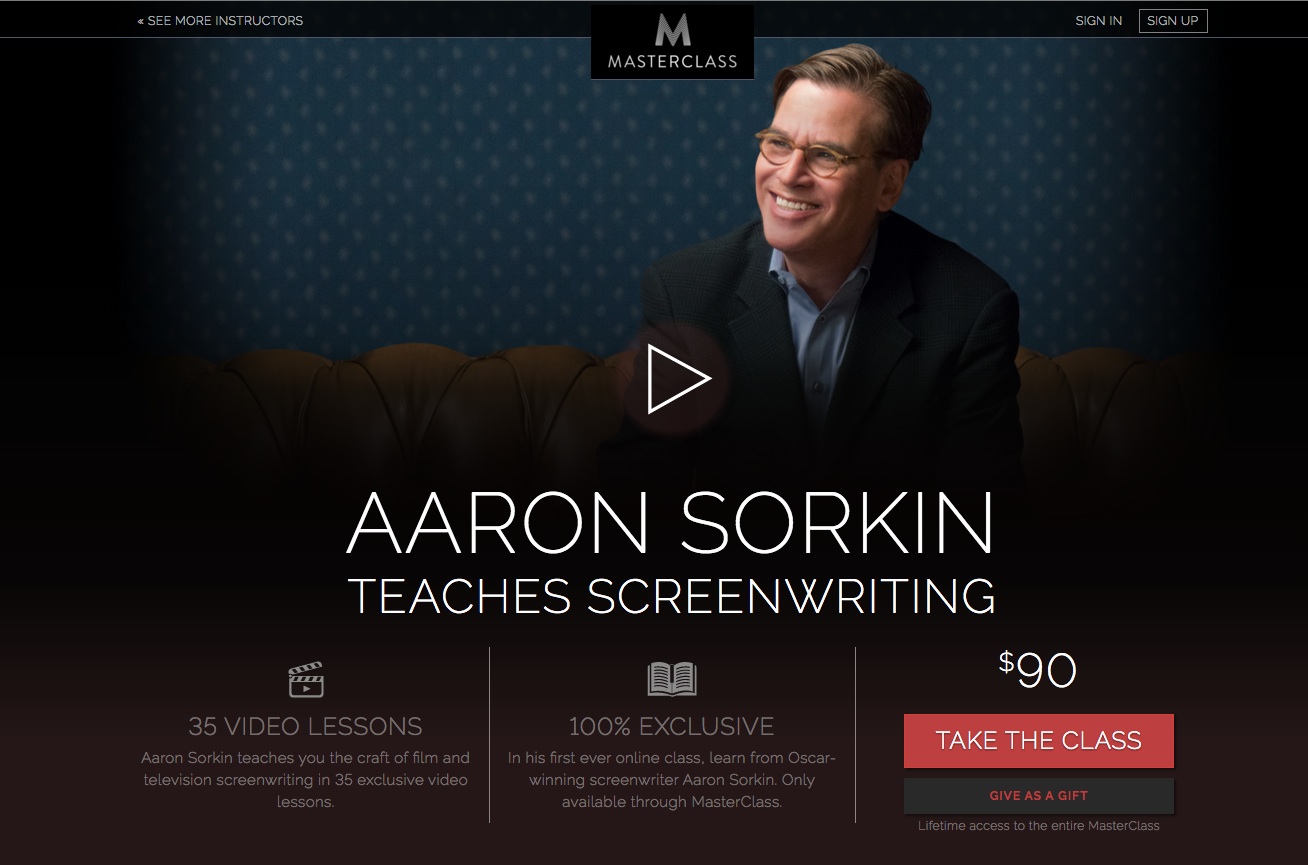
Hands down this masterclass is THE best shot, edited and curated video training series I’ve ever seen. The whole thing is beautifully shot, edited and produced, the sets look great even though they’re just out of focus in the background and there really is no comparison to the usual desktop-screenflow or greenscreen studio mock up of many an internet tutorial. The up-shot of all this is that its incredibly engaging and inspiring to watch.
In terms of attention to detail the online documentary editing course, Inside The Edit is probably still in a league of it’s own, that I don’t think anyone else will match any time soon, but the team behind Masterclass have done an excellent job and it’s worth drawing attention to.
5 Things Aaron Sorkin Can Teach Film Editors
Aaron Sorkin’s screenwriting course is absolutely jam-packed with wisdom, anecdotes and axioms that will leave you pondering a nugget for days, and plenty of interesting industry anecdotes sprinkled throughout too.
Here are 5 (of many!) things he teaches that are valuable to editors too.
1.What is the clear intention and the formidable obstacle?
In every scene and for each character what is it that they are out to achieve and what stands in their way? Although you may know internally what those are, ask yourself (or better yet a passing stranger) is it clear? Do you understand what is happening? If the intention is confused or muddied we won’t be drawn into the character’s journey. Without a believable and formidable obstacle, we won’t be engaged in the drama.
Without those basic building blocks you’ve got nothing.
2. Find the conflict and focus on that
Generally the conflicts that I write about are ideas. It’s usually not robbing a casino that has the greatest security system in the world. It’s usually a conflict of ideas and what you want is for the competing ideas to be equally strong.
As an editor, if you don’t know what the central conflict is about you can’t craft the scene around it. If you just wade into the rushes (especially in documentary) without this to guide you then you will get lost and the audience will get bored.
Developing a clear understanding of the central and conflicting themes, characters and situations will help you to clarify and heighten the drama.
3. Failure is par for the course
The honesty, candour and straight talk that Aaron delivers feels very much like what you get from Steven King’s On Writing.
Finding an idea, discovering the conflict around a strong, clear intention and a formidable obstacle is hard. Sorkin likes to use sports metaphors and his baseball analogy is that you have to look for ‘your’ pitch – the ideas you know you can at least swing at, and hopefully hit – and let the rest pass you by.
He also points out that if you can be successful two out of every three times you step up to the plate, you’re going to the hall of fame, much like with the movies.
As an editor and a creative individual it’s extremely heartening to hear someone as successful as Sorkin be frank about the difficulties involved in creating something really great. Sometimes you don’t. And that’s OK.
4. Attention to detail
Sometimes it matters sometimes it doesn’t. As an editor knowing what to cut out and what to keep in is a crucial skill and often a difficult balance to strike in any given scene.
Aaron gave an example of meaningless attention to detail, in which on a visit to the set of All The President’s Men, in the trashcan under a journalist’s desk he saw a crumpled up piece of paper with yesterday’s (in 1970 something) baseball scores. The camera’s won’t see it, so it doesn’t really matter. (But yes it’s cool to have such a high level of authenticity in your set design.)
Attention to detail that does matter is where it creates an effect that actually helps tell the story and pattern the world it inhabits.
One of the things I’ll look for often is cool patoire. Language specific to a vocation that will make us in the audience feel like those guys are really good at what they do, they know what they’re doing and there’s a whole vocabulary in there that I get to figure out.
Details that draw us in are worth pointing the audience towards, otherwise it’s just irrelevant noise.
5. Learn the rules of storytelling
Rules make art beautiful… It’s the rules that make art not finger painting. These rules apply to writing. The rule book is the Poetics by Aristotle.
Learning the rules of storytelling is key to telling a good story. For Sorkin, Aristotle has written them down in a ‘2500 year old, 64 page pamphlet’ which you can get on Amazon.com for 79 cents.
Buy on Amazon.com | Buy on Amazon.co.uk
I once heard another editor describe this book as gold dust, and so I’m looking forward to finally reading it, having ordered it off the back of the course.
The alternative, or complementary exercise is to watch films, TV and plays and take them apart. Deconstruct them by watching the film with the screenplay on your lap and cogitate on the similarities, interpretations and differences.
To conclude, Aaron Sorkin’s Masterclass is just that, a masterclass and you should grab it while you can.
Check out Aaron Sorkin Teaches Screenwriting on Masterclass.com
UPDATE – Hans Zimmer Composing Masterclass Review
For another in-depth review on another brilliant Masterclass.com course, check out this post on Hans Zimmer’s Composing Masterclass.
I go into detail on why it’s a great course for editors and includes 5 things Hans Zimmer can teach film editors, plus a whole lot more!
At the end of the day I can tell you everything you need to know in one word. Story.
Stick with the story, don’t abandon the story, don’t betray the story. Know the story that you want to tell. – Hans Zimmer
2018 UPDATE – Molly’s Game
Aaron’s first directorial debut is now out, in the form of Molly’s Game. I’ve yet to see it, but I’m encouraged by the Oscar nomination for Sorkin (Best Adapted Screenplay).
I thought I’d update this post with this great interview with the film’s two editor’s Alan Baumgarten and Josh Schaeffer.
AOTG.com’s Gordon Burkell interviews the duo on how they worked with Sorkin to ‘interpret’ his script and footage, the incorporation of of stock footage and narration, as well as the nuance of interweaving flashbacks and transitions.
He had written some lines in the script that were going to overlap and they were performed that way.
But beyond that he literally was like “People don’t listen to each other talk, and there will be times when the person knows what the next person is going to saying, so I want them to be talking over each other.
And we could find those places, looking at the scene cut, where I thought it was a really smart way to give the audience dialogue that feels real.
It’s a great listen for anyone interested in Aaron’s work.
Spend an hour or two with Aaron Sorkin
BAFTA has recently released this hour long conversation with screenwriter Aaron Sorkin on West Wing, The Newsroom and a whole lot more.
The Toronto International Film Festival has also released this hour long masterclass with Aaron, which includes questions and answers about directing Molly’s Game.
Learn more about the unbelievable start to Aaron’s career in film and television writing in this delightful ‘Timeline of My Career’ interview from Vanity Fair.

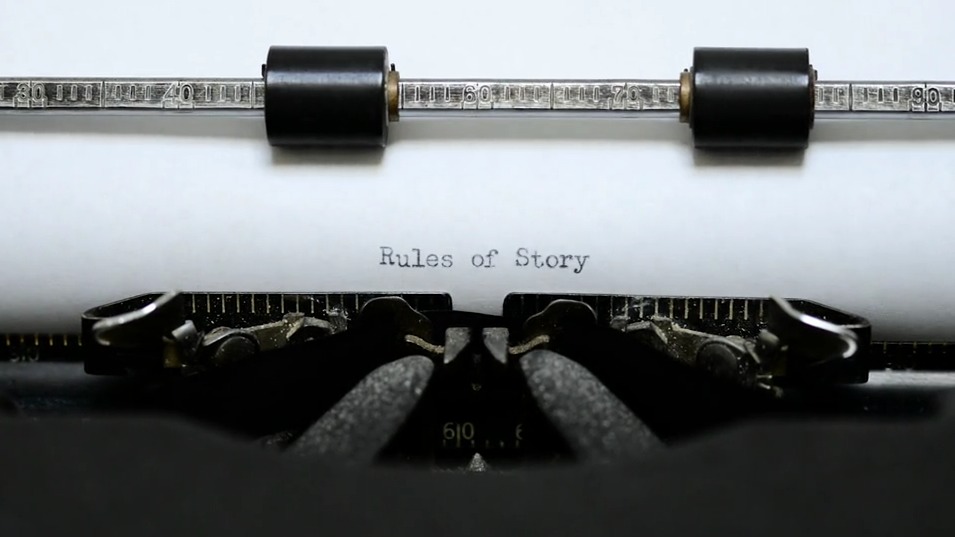
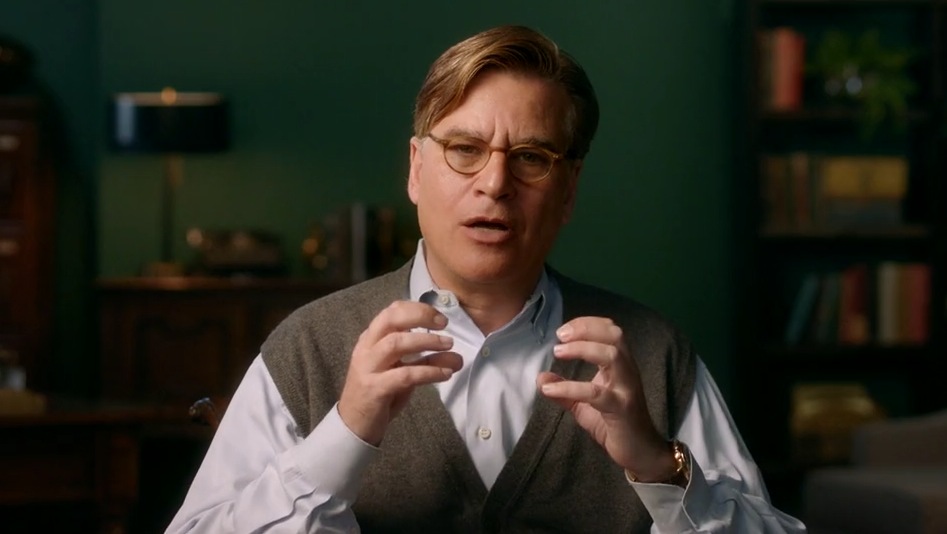
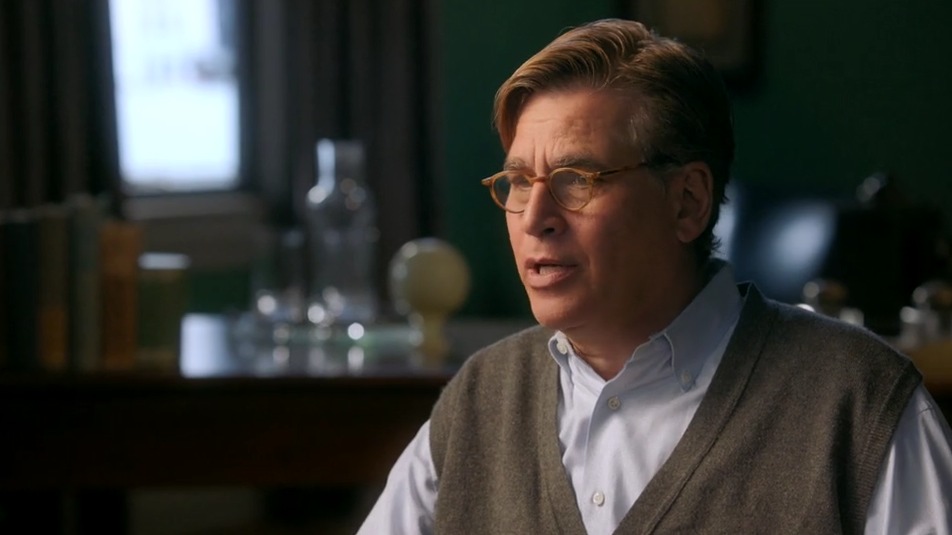
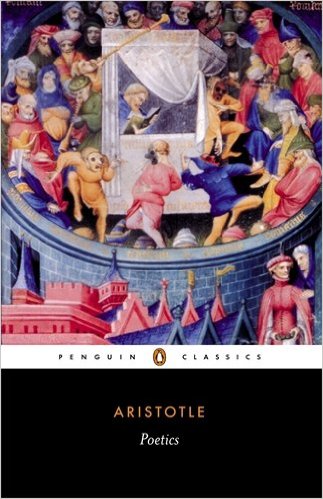


I’ve already signed up for Film Editing Pro(got it for $1000) and I’m going to sign up for ‘Inside The Edit'(at 50% off) in a day, thanks to your blog. Your website is like a ‘paradise’ for editors because of the amount of information you share on your blogs. Thank you!
And what about Werner Herzog Masterclass? Would you recommend it as well?… I would love to see Walter Murch Masterclass! I love his thoughts about film editing. I allready sent them this idea and I hope they are going to realize it…
Hi Filip,
I’ve not seen it but I hear it’s really good and does feature a section of Editing.
A Murch class would be great too! Maybe there is a way to submit requests on the Masterclass.com site?